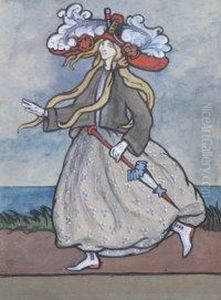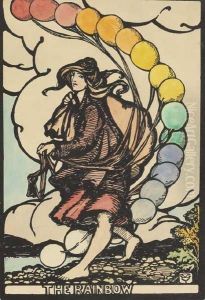Mary Cottenham Yeats Paintings
Mary Cottenham Yeats, also known as Cottie, was a notable figure in the Irish Arts and Crafts movement. Born in 1861 in England, she moved to Ireland after her marriage to the Irish painter, John Butler Yeats, who was the father of the famous poet William Butler Yeats and the artist Jack B. Yeats.
Cottie Yeats was not just a supportive spouse and mother; she was an artist in her own right. She was skilled in embroidery and was deeply involved in the Dun Emer Guild, an Irish version of the British Arts and Crafts movement, which aimed to revive traditional crafts and provide employment for women in Ireland. The guild was founded by Evelyn Gleeson in 1902, and Cottie, along with her daughters, Lily and Lolly Yeats, played a significant role in its operations. At the Dun Emer Guild, which later became the Cuala Industries, Mary Cottenham Yeats worked alongside her daughters to produce embroidered textiles and printed materials, including books and cards.
Cottie's life was steeped in the cultural revival of Ireland, and her home was a hub for intellectuals and artists of the period. This environment undoubtedly influenced her children, with William becoming one of Ireland's most celebrated poets and Jack developing into a prominent painter. The Yeats family's legacy in the arts is significant, and Cottie's contributions, especially to the field of textile arts and the promotion of Irish craft, are an integral part of that legacy.
Despite her immersion in the arts, Mary Cottenham Yeats kept a relatively low public profile, preferring to work behind the scenes. Her death in 1940 marked the end of an era for the Yeats family, which had played such a crucial role in the cultural life of Ireland during the late 19th and early 20th centuries. While not as widely recognized as her husband or children, her influence on the Irish Arts and Crafts movement and her commitment to cultural and artistic endeavors have ensured her a respected place in Irish art history.

